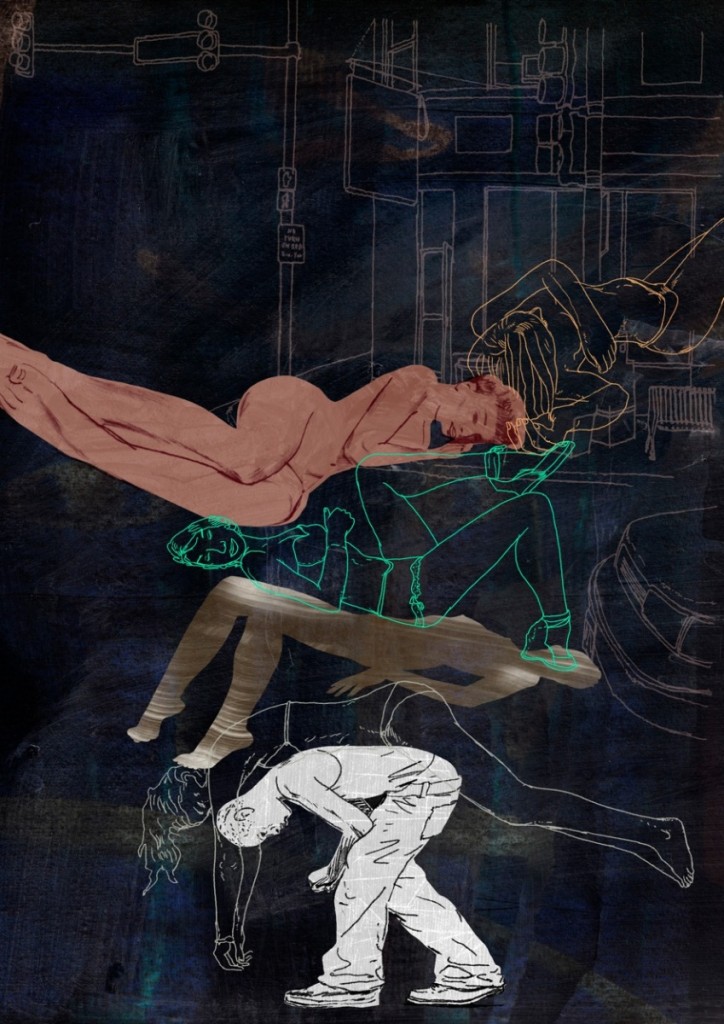“Although land is gone, countries and laws are here to stay.” In a world transformed by Climate Change, a gifted student covertly sets forth to alter humankind’s course…

by: Keishi Kajifune (Translated by Toshiya Kamei)
It was a Sunday when Shinzaki went missing.
Of course, there was no class on the weekends. Even so, the cafeteria served meals at regular hours. That Sunday, I hurried down there, carried my tray to my usual spot, and dug into my food before it became cold. The day’s menu —shrimp salad and clam pasta — cheered me up. After all, seafood was easy to come by on the sea. Then Maki showed up out of the blue. Without being invited, he pulled out a chair and sat down across from me.
“Did you hear about Shinzaki?” Maki asked. “They say he’s slipped out of the ship.” He sounded excited.
Nobody likes a terrible gossip, I thought to myself. As a matter of fact, Maki always got on everyone’s nerves.
“Shinzaki? Just saw him in the hallway a minute ago. If you hurry, you can catch him there,” I said, keeping a straight face.
“Seriously?” Maki bolted out of his seat and left the cafeteria. What a busybody. This wasn’t the first time he had stuck his nose in someone else’s business. Fortunately, I knew how to handle him.
With no one to left bother me, I resumed my belated lunch.
However, the rumor turned out to be true. Shinzaki had vanished. As the evening neared, grown-ups, teachers among them, made their rounds throughout the campus and meticulously checked each dorm room.
What trouble would befall us if one of us escaped from school? I had no idea how it would affect me personally, but dark premonitions filled my mind.
Later, those premonitions would come true, albeit in a slightly different fashion.
In the evening, I worked out, breaking a profuse sweat at the gym. After taking a shower, I went back to my room. There Shinzaki was waiting for me.
He was a bit odd. He often had his nose buried deep in hulking books for hours on end. Out of the blue, it occurred to him to keep microbes in a tank in the school lab. Once recognized for his experiment, he’d been invited to collaborate in a lab at a college in a faraway city.
Once when I was in his room, Shinzaki had bragged about his long list of accomplishments. While he chatted away endlessly, I glanced around and found a photo on the wall behind him. In it, Shinzaki stood next to a skinny young man in a white lab coat. Whoever he was, he didn’t look much older than us.
“Who is that?” I asked.
“A friend of mine. He’s a college student from the lab,” Shinzaki answered. “He studies seaweed-based hydrocarbons. He’s interested in my project. And vice versa. We became friends.”
“I see.”
Shinzaki then went on to talk about his friend. He added that the picture was taken when he visited him at his college on summer holiday.
Although each dorm room was designated for two students, I occupied my room alone. That’s because my roommate quit school after he was reportedly injured. With two loft beds with a desk in a small room, it was actually more fitting for one person.
Shinzaki sat on my ex-roommate’s empty chair. When he saw me come in, he held his index finger to his lips and waved me over, without altering his features.
I stepped inside quietly, closed the door behind me, and sat on my chair across Shinzaki.
“See this,” he said, removing something from his pocket and handing it to me. It was a translucent brown plate. I held it against the light.
“What is this?”
“It’s a prototype,” he said. “Plastic made of seaweed-based hydrocarbons. They gave me this sample.”
I had no idea why this was important. It looked like an ordinary plate.
“How did you manage to sneak out of school?” I changed the subject. “How did you get back?”
“Let’s see. You’ve seen the tender that goes to the city, haven’t you? I hid myself in the large case in the tender and ended up in the city. It was a cinch.”
“Where did you go?” I asked.
“They won’t give you permission for sightseeing,” he said, evading my question.
He was right, of course. Unless there was a death in your family, you were not allowed to visit the outside world. Our school was strict about things like that.
“Hey, why don’t you come with me next time?” Shinzaki suggested. “I’ve got the tender’s schedule memorized.”
“No thanks.” I turned down his invitation. “It’s too far.” I sighed.
“Not really,” he said. “You can see the city from the deck. Come with me. I’ll show you.”
We pushed the heavy door open and found ourselves on the deck. Beyond the chest-high handrail the vast expanse of the ocean stretched as far as the eye could see.
We stood on the Minerva’s stern. The ship remained offshore of a floating city in the process of expansion. The sun was ready to dip behind the western horizon.
“Look,” Shinzaki said, pointing.
As I squinted, I caught a glimpse of the outline of a large construction crane. The city. It was an artificial one, but it was still valued. Terra firma had been scarce since the Great Rise.
Except for this artificial land, we were in the midst of the sea glowing in the blazing sunset.
My grandparents’ generation experienced drastic sea level changes caused by several factors such as Climate Change. We now refer to this phenomenon as “The Great Rise.” As a result, humanity lost much of its land. Yet thanks to the advent of new technology prior to The Great Rise, we managed to secure food sources and energy production. Thus, it wasn’t that difficult for us to survive.
Since then, humans had lived on the few remaining masses, artificially constructed floating cities, and ships.
Some ships provided living space. Others doubled as workplaces. On farming ships, the decks served as fields where genetically modified crops such as wheat, potatoes, and vegetables were cultivated. Compared to pre-Great Rise ships, today’s ships were much larger because they were designed to accommodate a variety of human activities. In each area, ships gathered together to form clusters in order to share limited human resources such as teachers and doctors. Thus, each cluster of ships had at least a hospital ship and a school ship.
Yet, our ship was special.
Ours functioned as an old-fashioned boarding school where we studied while sailing around the world. As the school could, at least in theory, accept new kids at each place we visited, we were supposed to benefit from diversity. That’s how the school was advertised. In reality, only kids from certain areas were allowed to enroll. It was because of the laws. Our teacher once told us, “Although land is gone, countries and laws are here to stay.”
An evening sea breeze swayed Shinzaki’s hair.
We stood side by side and gazed at the darkening sea.
“Land is great,” Shinzaki mumbled. “It’s the epitome of human innovation.”
Most kids at our school came from families who lived on land. That meant they were financially well-off enough to afford to live there.
One the other hand, I was born and bred on a ship, so unlike some kids who grew up on land, I didn’t mind living on this ship at all.
“That’s for sure,” I played along. “I hope to live on land after I graduate.”
Still, I kept wondering why Shinzaki had snuck away. Would he take such a risk just for a piece of plastic? My ex-roommate got kicked out of school after he threw himself overboard in a bid to become a little merman. According to the school’s official version of the story, he injured himself when he dove into the sea. But everyone knew that was a pretext. As our school traverses a great distance, its administration has to impose strict rules to prevent potential accidents. Maybe expulsion awaited Shinzaki, too, for pulling a stunt like that.
Maybe he wanted to meet someone.
Shinzaki had been in touch with that college student. He supposedly lived in the city near the port. Our ship was regularly docked at some port in order to acquire necessities, according to a predetermined schedule. So it was quite possible that Shinzaki planned something along those lines.
Perhaps Shinzaki wanted to see his friend in person.
“Did you get to meet him?” I asked.
“What do you mean?” He gazed at me innocently and flashed a melancholy smile. Perhaps things didn’t go as he had expected.
Shinzaki had always tried to break free from the shackles of convention. Even though I didn’t have what it took to be like him, I admired him for that.
After I went back inside, I decided to help Shinzaki come up with a plausible explanation for his disappearance.
“Don’t worry about it,” he said. “You shouldn’t get involved.” Even so, I was determined to help him out for my own sake rather than for his.
Shinzaki came to my room in the morning and confided in me. There were things he didn’t share with anyone else that he felt comfortable confiding in me. Tormented, he didn’t want to face other kids for now.
I decided to find a teacher with sympathetic ears. At dinnertime, Shinzaki appeared at the cafeteria, pretending to be more despondent that he actually was. The following day, he showed up to class as if nothing had happened.
There in the same classroom, I let my thoughts drift toward the land somewhere beyond this window.





